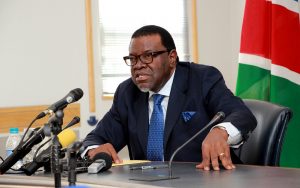
Namibia will end the nationwide lockdown on 4 May 2020 but will make the wearing of facemasks outside the home mandatory.
In an address to the nation on Thursday, President Hage Geigon said that although it is very important to make the people’s health a priority, there was a need for a balance this with livelihoods.
Currently, Namibia has 16 cases of which eight are still active.
The State of Emergency declared on 17 March 2020 will remain in force for a period of 6 months and may be extended, subject to the changing country situation.
In His address Geingob said the cases reported in Namibia are classified as sporadic and that there has been no community transmission and deaths.
“I have indicated that the health of Namibians remains our greatest priority. Our prompt action to close all points of entry and issue comprehensive restrictions on the movement of people has therefore helped to contain the spread of disease,” Geingob said.
He added that while he recognized that these extraordinary measures have caused great disruptions to daily lives, they were necessary and effective.
Geingob said in conformity with global guidelines on the national response to COVID-19, Namibia has adopted 4 stages of restrictions.
STAGE 1 is the current situation of a countrywide lockdown for a period of 38 days, from 28 March until midnight, 04 May 2020.
STAGE 2 will be a gradual re-opening under Strict Precautions, from Tuesday 05 May 2020 to 2nd June 2020.
STAGE 3 will see more Moderate Precautions and could come into effect from the 2nd of June 2020 to 30 June 2020.
The final STAGE 4 from 30 June 2020 will introduce a New Normal and could last until the end of the State of Emergency.
During stage 2, the following will happen:
1. All members of the public are required to wear facemasks in public spaces. The government will assist vulnerable persons to acquire masks.
2. People will be permitted to travel domestically between regions and within towns and cities, without restriction.
3. The borders will remain closed for non-Namibians but returning Namibians will be permitted to re-enter the country, subject to screening at points of entry and supervised quarantine for 14 days.
4. Businesses and productive activities, unless prohibited will be permitted to reopen, subject to responsible personal and organizational conduct and in compliance with the prescribed Health & Hygiene Guidelines.
5. In addition to fulfilling the established protocols, the following businesses will be allowed to resume, subject to specified conditions:
o Shopping Malls and Retail Outlets.
o Restaurants to continue operating on a take-away basis as before.
Buying and selling of alcohol is prohibited.
o Kapana traders may only operate for takeaway and private consumption.
o Beauty, Hair Dressers & Barbers subject to proper personal protective equipment.
o Laundromats and Tailors: subject to proper personal protective equipment.
6. The following activities are deemed to be high-risk under the circumstances and will not be permitted to resume activity during STAGE 2. These are:
a. Theatres and cinemas;
b. Gyms and exercise centres;
c. Contact sports and sporting events;
d. Gambling houses and nightclubs;
e. Liquor outlets, Bars and Shebeens;
f. Entertainment events and concerts;
g. Seminars, Conferences, Workshops and Summits.
7. The buying and selling of alcohol remain prohibited throughout the country.
8. The progression from one Stage to another will be informed by developments on the cases and the details of Stages may change.
Geingob said the tentative activities for stages 3 and 4 are available in a document.









Comments